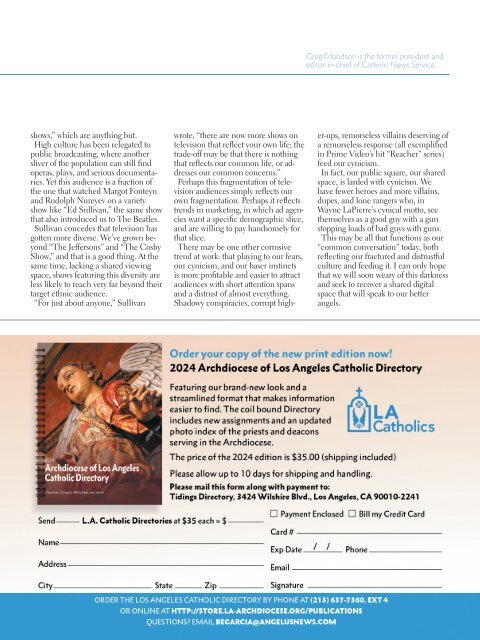Angelus News | February 9, 2024 | Vol. 9 No
On the cover: Catholic worshippers recite lines during the Stations of the Cross prayers at the Holy Cross Cathedral in Lagos, Nigeria, on Feb. 24, 2023. On Page 10, John Allen takes a closer look at the unfolding pattern of violence targeting Catholics there, and what it means for the universal Church.
On the cover: Catholic worshippers recite lines during the Stations of the Cross prayers at the Holy Cross Cathedral in Lagos, Nigeria, on Feb. 24, 2023. On Page 10, John Allen takes a closer look at the unfolding pattern of violence targeting Catholics there, and what it means for the universal Church.
You also want an ePaper? Increase the reach of your titles
YUMPU automatically turns print PDFs into web optimized ePapers that Google loves.
Greg Erlandson is the former president and<br />
editor-in-chief of Catholic <strong>News</strong> Service.<br />
shows,” which are anything but.<br />
High culture has been relegated to<br />
public broadcasting, where another<br />
sliver of the population can still find<br />
operas, plays, and serious documentaries.<br />
Yet this audience is a fraction of<br />
the one that watched Margot Fonteyn<br />
and Rudolph Nureyev on a variety<br />
show like “Ed Sullivan,” the same show<br />
that also introduced us to The Beatles.<br />
Sullivan concedes that television has<br />
gotten more diverse. We’ve grown beyond<br />
“The Jeffersons” and “The Cosby<br />
Show,” and that is a good thing. At the<br />
same time, lacking a shared viewing<br />
space, shows featuring this diversity are<br />
less likely to reach very far beyond their<br />
target ethnic audience.<br />
“For just about anyone,” Sullivan<br />
wrote, “there are now more shows on<br />
television that reflect your own life; the<br />
trade-off may be that there is nothing<br />
that reflects our common life, or addresses<br />
our common concerns.”<br />
Perhaps this fragmentation of television<br />
audiences simply reflects our<br />
own fragmentation. Perhaps it reflects<br />
trends in marketing, in which ad agencies<br />
want a specific demographic slice,<br />
and are willing to pay handsomely for<br />
that slice.<br />
There may be one other corrosive<br />
trend at work: that playing to our fears,<br />
our cynicism, and our baser instincts<br />
is more profitable and easier to attract<br />
audiences with short attention spans<br />
and a distrust of almost everything.<br />
Shadowy conspiracies, corrupt higher-ups,<br />
remorseless villains deserving of<br />
a remorseless response (all exemplified<br />
in Prime Video’s hit “Reacher” series)<br />
feed our cynicism.<br />
In fact, our public square, our shared<br />
space, is larded with cynicism. We<br />
have fewer heroes and more villains,<br />
dupes, and lone rangers who, in<br />
Wayne LaPierre’s cynical motto, see<br />
themselves as a good guy with a gun<br />
stopping loads of bad guys with guns.<br />
This may be all that functions as our<br />
“common conversation” today, both<br />
reflecting our fractured and distrustful<br />
culture and feeding it. I can only hope<br />
that we will soon weary of this darkness<br />
and seek to recover a shared digital<br />
space that will speak to our better<br />
angels.<br />
<strong>February</strong> 9, <strong>2024</strong> • ANGELUS • 27

















